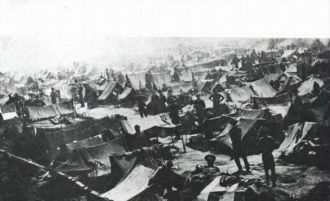Advertisement
Advertisement
Caroline Hancock
About me:
Born in California. My hometown had a Pony Express station.
About my family:
I haven't shared details about my family.
Updated: January 5, 2023
Message Caroline Hancock
Loading...one moment please


Recent Activity
Caroline Hancock
updated a photo
Jan 05, 2023 7:34 PM
Caroline Hancock
updated a photo
Jan 05, 2023 7:33 PM
Caroline Hancock
followed a last name
Dec 18, 2022 11:22 AM
Caroline Hancock
followed a last name
Dec 18, 2022 11:22 AM
Caroline Hancock
followed a last name
Dec 18, 2022 11:22 AM
Photos Added
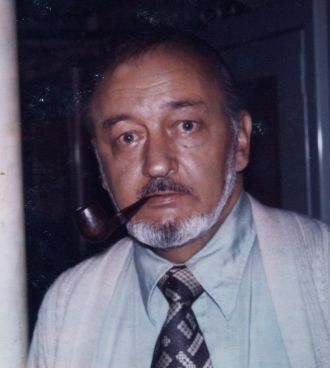
Robert L. Rominger
A photo of Robert Luther Rominger, Jr.
Son of Robert Luther Rominger, Sr.
Born 11 March 1922
Son of Robert Luther Rominger, Sr.
Born 11 March 1922
People tagged:
Recent Comments
Caroline hasn't made any comments yet
Caroline's Followers
Richard Hancock
About me:I haven't shared any details about myself.
Favorites
Loading...one moment please


Kevin Frye
I am a local historian and NPS Volunteer at Andersonville Civil War POW site. I do volunteer research for descendants of Civil War Prisoners and work to preserve the memory of those buried in the National Cemetery here.
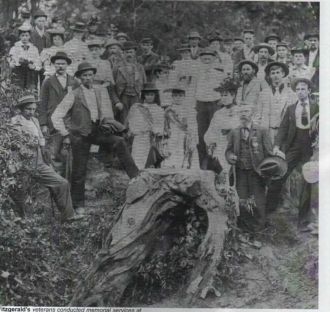
Andersonville Reunion
This is a photo of a Prisoners reunion at Andersonville. It was taken at the "Providence Spring " which is located in the stockade pen.
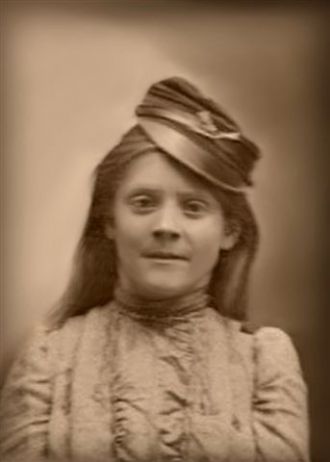
Confederate Girl
Young woman wearing a Confederate cap. She may be Malinda Jane Cavin of Jackson Co, AL who married Jesse (John)Owens.
We would dearly love to know the identity of this girl and know if this is her brother's, boyfriend's/husband's, or father's cap.
We would dearly love to know the identity of this girl and know if this is her brother's, boyfriend's/husband's, or father's cap.

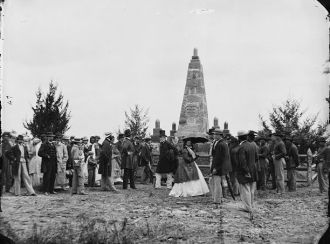
Bull Run, Va.
Bull Run, Va. Dedication of the battle monument; Judge Abram B. Olin of the District of Columbia Supreme Court, who delivered the address, stands by the rail
People in photo include: Abram B. Olin
People in photo include: Abram B. Olin

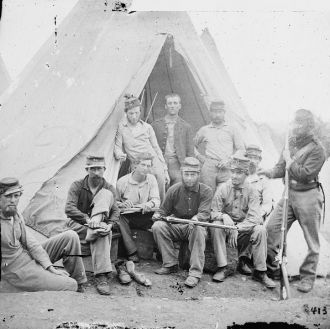
71st Infantry Regiment - New York 1861
The 71st Infantry Regiment of New York has an interesting history. In 1852 eight companies formed to become the 71st regiment of the state militia, led under Colonel Abraham S. Vosburgh.
On April 16th, 1861, 380 men mustered under Colonel Vosburgh and paraded down New York Ave in response to Lincoln's request for troops to fight in the United States Civil War. The 71st played critical roles in two of the most famous Civil War battles including the First Battle of Bull Run where they protected the retreat, and two years later where they fought at the battle of Gettysburg.
On July 4th, 1867 the 71st Infantry regiment joined the 7th New York and served as riot control during the riots in the Sixth Ward between the Bowery Boys and the Dead Rabbits.
On April 16th, 1861, 380 men mustered under Colonel Vosburgh and paraded down New York Ave in response to Lincoln's request for troops to fight in the United States Civil War. The 71st played critical roles in two of the most famous Civil War battles including the First Battle of Bull Run where they protected the retreat, and two years later where they fought at the battle of Gettysburg.
On July 4th, 1867 the 71st Infantry regiment joined the 7th New York and served as riot control during the riots in the Sixth Ward between the Bowery Boys and the Dead Rabbits.
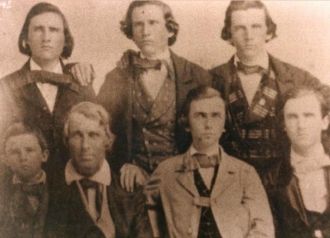
Dr. Thomas Jefferson Pitchford & sons, NC
Dr. Thomas Jefferson Pitchford & six sons: Thomas served in the NC State Senate. These sons were in the Confederate Army. Samuel enlisted but was sent home because of his age. 1 son was killed in the Battle of 7 Pines, another was shot in one of the last battles, dying on the way home.
People in photo include: Samuel Waite Pitchford
People in photo include: Samuel Waite Pitchford

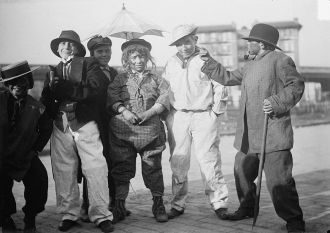
Thanksgiving Maskers circa 1910
Thanksgiving maskers were children who dressed up on the last Thursday of November and begged for fruit and money. (This was before Halloween was celebrated.) There was a large uproar about this practice - newspapers denounced parents who allowed their children to follow this "hooligan" practice. These children look like they were having fun!
Photo courtesy of the Library of Congress, Bain News Service
Photo courtesy of the Library of Congress, Bain News Service

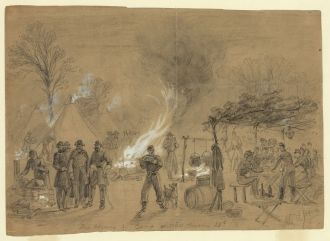
Alfred R Waud Sketch of Thanksgiving 1861
Alfred R Waud's sketch of Thanksgiving in a Civil War camp, Thursday November 28th 1861. This may be the camp of General Louis Blenker.
Alfred Rudolph Waud was an artist who was most remembered for the sketches that he made as a correspondent for the Civil War. Since the technology didn't exist for photos to be printed in newspapers, Waud was instrumental in bringing scenes of the Civil War to the public.
Sketch courtesy of the Library of Congress, Alfred R Waud
Alfred Rudolph Waud was an artist who was most remembered for the sketches that he made as a correspondent for the Civil War. Since the technology didn't exist for photos to be printed in newspapers, Waud was instrumental in bringing scenes of the Civil War to the public.
Sketch courtesy of the Library of Congress, Alfred R Waud

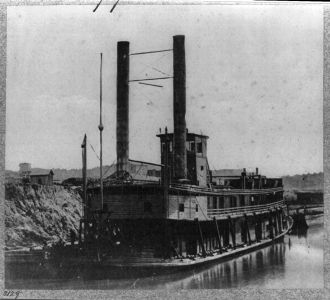
Mississippi River Fleet - US Civil War
Photo of an old steam boat that patrolled the Mississippi river during the time of the US Civil War. Believe it or not, this was the beginning of the US Navy!

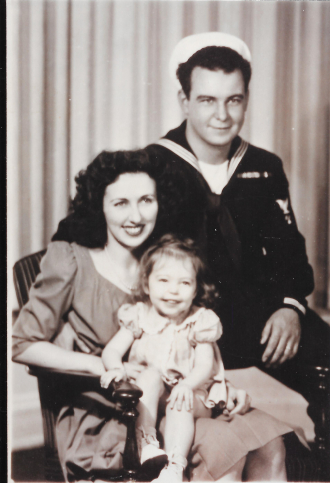
Orville Robert Loux (1922 - 2011)
Oz (Orville Robert Loux) was my father. He was an unexpectedly complex and very intelligent man. He was the son of Nicholas D. Loux and Cordelia Queen Loux (nee Case). He grew up in a family of 8 children and worked from the age of 8 in a bake shop. Raised during the 1929 Great Depression, he contributed to the family income. As a child he also did not have a bed and slept on a mat under a table on the first floor of their home. He married his first love (Marilyn Ruth Juett; 1922 - 1999) and had 5 children (Pat, Ron, Nick, Kim and Janet). He then enlisted in the Navy in World War II to avoid being drafted into the Army (he said that if he was going to die he wanted to die in a clean bunk). Although no one would have described him as a studious nerd, he graduated from high school with an average grade of 92. Both he and his brother Earl resisted pressure from their mother Cordelia to attend college and medical school. As a child, due to his artistic abilities, he was singled out to take free art lessons from an art school in Cincinnati. I remember he once sketched out free hand a wooden sword that appeared to have the perfect dimensions of a scimitar. His toy stoves, refrigerators etc. for my young sisters were legendary (yes, you could bake cupcakes in his toy stoves). On another occasion he built a rubber band powered machine gun for my brother that fired wooden bullets when the crank was turned. He also built a plywood boat that he named the Patronick in honor of his three children at the time; the boat was stored in the back yard but disappeared when the creek in our back yard overflowed. He had an encyclopedic memory. In the pre-GPS pre-cell phone age he could give you directions to anyplace within 50 miles of Cincinnati and advise you as to which lane to take and which traffic lights were best avoided.
He was astonished when the Navy sent him to machinist’s training given that he had more than a decade of experience in a bake shop. He subsequently was placed in charge of the machine shop on the U.S.S. Carter Hall. You can imagine the responses of much older and experienced Navy machinists when placed under the authority of a 20 year old but he was given the position because of his mathematical skills. It was in the Navy that he learned how to use lathes and milling machines; these skills were subsequently used (along with his brother Earl) to build ingenious roll formers in the family business of Weather Rite Manufacturing/Weather Products Incorporated. These roll formers were then used to transform 12 inch, 10 inch and 8 inch flat aluminum coil stock into the pans used to construct aluminum pan-and-cap, step down, weather port and V pan awnings.
His training in a bake shop was not entirely wasted. Early on the captain of the USS Carter Hall was enraged because the movement of the ship prevented the bread from rising and he hated flat bread. The cook was in a panic but my father advised him to use high gluten flour and place the dough initially in a very high temperature oven in order to set the crust. With gratitude from the ship’s cooks, my father used his trusty home-made hot plate to eat as well as the officers on board the U.S.S. Carter Hall. He said the steaks were especially tasty but after the war found that the fried Spam sandwiches were not nearly as good as he recalled on the ship. Those interested in his war time experiences may wish to visit his online interview in the Veteran’s History Project.
As with my brother Ron, my father was someone who was always doing something. When his ship was at anchor in the Navy, my father would go on shore and buy ice cream. He would return to the ship, resell it and then send the profits home to his wife Marilyn and daughter Pat. I believe it was in New Guinea that he toured a battle zone and collected a large amount of Japanese military equipment. He said the officers on board placed his Japanese machine gun on deck, fired the ammunition and threw the machine gun overboard. He did however also have an authentic hara-kiri knife and used it as a model to create new ones in the ship’s machine shop. Profits from these also were sent home to his wife and daughter.
After the war my father and his bothers Earl and Will purchased the Stone Jug, a bar in Cincinnati. The city subsequently redirected the main highway to Indiana away from where the bar was situated and the bar went bankrupt. He then acquired a job installing red wood storm windows from a man that I seem to recall was named Lou Peller. Eventually, his parents mortgaged their house to provide funding to create a new wholesale home improvement business named Weather Rite Manufacturing Company (along with his brother Earl). This business was created as a family business and for nearly 3 decades it provided employment for him, their mother Cordelia, his brothers Earl and Will, his sister Janet, his brother-in-law Clyde, my brother Ron, me and my sister Pat and her husband Don. Other more distant family members as well as non family members also were employed there. Over the years I recall a number of very successful businessmen who expressed something akin to awe at the creation of a small business that not only survived but thrived for such a long time.
My father was a workaholic. Early on our family had little money and we would occasionally have family outings where we would pick up hot dogs from the butcher’s shop, build a fire in the woods and cook them (along with baked beans) for a picnic. On one occasion we took our dog Chris with us. After the fire was built no one could find the hot dogs. I do recall that we eventually found the butcher paper and Chris was sitting there with a very contented look. When I was young I recall him often being gone in the morning when I awakened and not being home when I went to bed. We had one family vacation in the early 50's where we visited family living in Biloxi, Mississippi. It was ten years before we had another vacation in Crystal River, Florida. We did have two family trips to Jamaica in the mid 60s.
As Weather Rite/Weather Products produced custom aluminum awnings and storm windows, one of my father’s jobs was to visit each residence and make the necessary custom measurements. He typically drove 35,000 miles per year and bought a new car every three years. As the business prospered, he drove new Buicks in the mid 50s and graduated to Cadillacs and a Lincoln Continental in the mid 60s. I recall that his Lincoln had an exorbitant price of $7,500. When my older brother was dating, he would sometimes borrow my father’s car. They did have one “Come to Jesus” meeting one morning after my father ran out of gas on the half mile trip to the gas station. I remember borrowing his Lincoln one night while I was dating. My father received a telephone call from his friend and Blue Ash police chief Ralph Conlon; he asked why my father was observed speeding over “Myrtle’s Hump” on Pfieffer Road. It was said that a car could be launched into the air traveling over “Myrtle’s Hump” and the city removed it after several cars became casualties. On occasion my father would assist the police department in following suspected drug dealers. He once commented that those being followed would determine if they were being pursued by illegally driving over the median strip on the Cross County Highway.
Oz had an lifetime habit of drinking massive quantities of Pepsi Cola (my mother preferred Coca Cola). Unlike my brother, my father was never unduly concerned with the particles floating in his Pepsi bottle after his children took a drink from it. His empty Pepsi bottles provided income for his children because the empties could be redeemed for 2 cents/bottle. I recall the many occasions when I would haul two 6 packs of empties to a small store that was approximately ~½ mile from our home and redeem them for a bag of potato chips, an RC Cola and two pieces of penny gum. I never quite mastered the technique of hauling four 6 packs to the store. I do believe however that the income from the empty Pepsi bottles surpassed the childhood income from the spare change jar that he kept in his bedroom.
My father’s family had a great deal of mistrust of the government. I recall in the 60's that OSHA intervened at Weather Rite and ordered them to install a significant number of “safety” improvements. This was despite the fact that to my knowledge, no one ever experienced any significant injuries in the shop. The only significant injury in the business that I recall is when an employee broke his leg when a ladder fell during an installation job at a home in Cincinnati. My father and Earl insured that this employee had a pay check until he was able to return to work. I think it is fair to say that most of my father’s family members viewed government intervention in the same light as they would view a stray rabid animal wandering into their back yard. My father and Earl always went out of their way to instruct employees on the safest way to perform any task. I was something of a rebel and had a 24 year career in the federal government; as a result I have come to adopt the family position that the government is not the solution, it is the problem.
My father was an avid supporter of the Second Amendment and a long time member of the National Rifle Association. Despite the fact that he had one weak eye (something that I inherited), he operated a 20 millimeter antiaircraft gun during general quarters on the U.S.S. Carter Hall during World War II. He believed that he was appointed to the gunner position because he knew to lead moving targets. He had a very fine gun collection. His comfort with firearms once paid off very well. One day during his retirement he was driving his Ford 8 N tractor around his 60 acres of “God’s Country” when he observed two young men on his property. He informed them that they were trespassing and that they would have to leave. One said to the other “Let’s get the old man”. They started to approach him at which point he lifted his trusty revolver and both wisely decided to leave.
My fathers family included a number of relatives who were deaf. He once taught me the sign alphabet. There is one story of when my father was a young boy. He was not allowed to use foul language. One day he was in a room with his deaf relatives. He apparently knew that they could read lips. He turned away from his deaf relatives and made some unmentionable statements; his downfall was that although he was facing away from his deaf relatives, he made the statements in front of a mirror.
Probably because of his childhood, he always maintained the position that “kids are sharp”. He once told me of the mother of one of his childhood friends who would giver her sons a whipping once a week as punishment for the things that they did that she didn’t know about. Although I do not recall his ever physically punishing his children (he left discipline to my mother), I think he was always somewhat wary of stories told to him by his children. As a child he and his friends would place their hats on the ground before they started to play baseball. The problem was that a neighborhood bully would come along and kick their hats. They solved the problem by placing bricks inside of the hats; after one encounter the bully never came around again. Recollection of this event probably saved him from more serious injury as an adult. Our family had a large pillow sized stone at the foot of our driveway. One evening my father was walking towards our house and he spied a paper grocery bag in the middle of the street near the driveway. In exuberance he lifted his leg and proceeded to kick it. He then had a recollection of the brick in the hat and decreased the velocity of his kick. I do remember blood leaking from the toe of his shoe but he likely avoided more severe injury because of the recollection. I also remember that he and his childhood friends would take candles and use paper bags to make miniature hot air balloons. They fled the area when the police arrived. One of his childhood friends had an extremely imposing mother who was able to chase the police away and criticize them for picking on her innocent boys. His best childhood friend became a paratrooper who was shot in the air and died during D Day.
I recall only two times that my father missed work due to injury. The first occurred after my father bought a trampoline for the family because he and my mother returned from an evening out one time and discovered their bed frame had collapsed and the mattress and box springs were lying on the floor (my brother had been teaching me how to use a trampoline) when he attempted to perform a stomach drop on a trampoline and instead hit feet first and his spine was snapped in the manner of a bull whip. He was out for a week or so. The second time was when he was swinging on a grape vine in the woods and it snapped. Again he was out for a week or so.
After World War II my father took flight training that was paid for by a GI Bill and he found flying aircraft to be one of his greatest loves. Due to both the potential danger and the expenses associated with flying, he regretfully abandoned this pursuit. I recall that his life insurance would have been voided had he perished as a crew member on an aircraft. He also once said that after the war one could buy a surplus fighter plane for $50 (without the armament) but that they were such gas guzzlers that no one could afford to fly them. For the rest of his life he did enjoy both shooting and scuba diving. In retirement he once dove in the cave of the sleeping sharks. He was not an avid golfer but I suspect he occasionally engaged in the sport for business purposes.
When I was around 12 years old my father, my brother Ron and I took scuba diving lessons and became certified divers (my sisters at home were too young and my mother was uninterested). At one point my father acquired wet suits for us (my father’s wet suit was purchased from a former husband of Zsa Zsa Gabor). A wet suit keeps a diver warm by allowing water to enter the crevices inside the suit which is then warmed to body temperature. One winter day we decided to test the wet suits. We broke the thin ice covering a swimming pool and jumped in. I recall that when the water entered my wet suit, it felt as if someone had poured boiling water onto my skin. We never tested them again.
On another occasion we were scuba diving at Sportman’s Lake. The water in Sportman’s Lake was clear enough that sunlight penetrated to the deepest portions of the lake (unlike Houston Lake and the Ohio River). We returned from one dive in the lake in order to eat lunch. My father opened a bottle of cream soda for my young sister Kim and it was apparently warm and sprayed out upon opening. As we finished lunch my father became alarmed when he looked down and saw pink splotches on his arms. Pink splotches on the skin are one symptom of air embolism. Air embolism is caused when you ascend from the depths of a water body too fast and do not sufficiently allow the expanding air in your lungs to escape. Essentially, the expanding air can force air bubbles into the blood stream. My father was greatly alarmed when he first saw the pink splotches on his arm but then discovered that the pink blotches wiped off with a wet cloth. He then recalled the spraying from the opened bottle of cream soda.
At my fathers request, I once scuba dived in the Ohio River in an effort to retrieve an expensive pair of prescription glasses that had fallen from a dock. I remember that the water was so black that I had to hold my dive light up against my mask in order to see the red glow of the flashlight filament. Basically, I dove using my hands because nothing could be seen. I also remember a dead tree rolling down the bottom with the current that lightly touched my feet. As it turned out, someone else had retrieved the glasses before I arrived. On another occasion I engaged in the search for the body of a drowning victim in Houston Woods Lake. We did not find the body but I remember that you had to navigate by feel through a forest of fishing lines suspended in the water column.
My father had a can do attitude that he imparted to his children. I recall one time I was installing a very large aluminum awning (using aluminum I beams) on a home in Cincinnati. I was thrilled because my installation fees were based on the square footage of the awning that I installed (25 cents per square foot). The home owner came out halfway through the job and asked if I was sent on this job by my father. In surprise I asked if he knew my father. He responded that he didn’t know my father but that he was certain that only a father would send someone on a job like this alone. I also recall that the family business had a set of wooden 40 foot extension ladders that were stored outside. Because they absorbed water vapor, they were incredibly heavy. My father said that those ladders were for men under 40 because no one over 40 could lift them (I carried them around one 20 foot section at a time and only assembled them on site).
Despite being a workaholic, my father was greatly involved in civic activities. He was a founding member of the Blue Ash Lion’s Club. He sponsored several little league baseball teams. I also recall that he along with a number of men including Bill Beets, Harold Weisenbaugh, Bill Herwey and Charlie Gruber built night lights on the little league baseball field at the former Blue Ash Elementary School at the corner of Kenwood and Cooper Roads. Bill Herwey used his military contacts to commandeer a drilling rig that enabled them to install telephone poles in order to mount the lights. I do recall watching the construction and later learned that a lineman acquired severe splinters because he slipped descending one of the telephone poles.
My father and his friends also were heavily involved in the parades and carnivals associated with holidays in Blue Ash. I remember seeing WW I veterans in uniform marching in the parades. At one holiday carnival a booth was set up for fund raising that involved tossing ping pong balls at gold fish bowls in an effort to win a gold fish. As the night drew to a close there were several dozen gold fish in bowls remaining that no one wanted. A young boy purchased a batch of ping pong balls and was astonished that so many of his balls fell into the bowls that were in front of the people attending the booth. I always wondered what the boy’s parents thought when he walked away with such a large number of gold fish.
My father’s creative skills were enormous. As a boy I greatly enjoyed watching him in our basement during his building activities. The lights in the basement used to blink when he first turned on his Delta table saw. Aside from outside construction projects, he rarely used nails and he assembled his creations with wood screws using his Yankee screwdriver. Although he generally disliked using nails, he could drive spikes into wood with only a few heavy blows with his True Temper Rocket hammer (both the Yankee screwdriver and Rocket hammer find use today). Unlike me, I never saw him with mashed fingers that resulted from driving nails. He and my mother both intensely liked furniture in the Ranch Oak genre. Their Ranch Oak couches and chairs were purchased at a store, but my father built a beautiful Ranch Oak gun cabinet as well as other items of furniture. He was more than willing to ably take on any home construction/repair activity except for plumbing. Although my carpentry skills can sometimes rival my fathers, I also inherited his aptitude in plumbing skills. My father was so good at so many things that it was somewhat intimidating when I was a young man.
There were several occasions when my father greatly surprised me. He once confided to me that he did not object to Democratic administrations because the ample free flowing cash was a true boon to the family business. In 1972 I received notification that I was to be drafted into the military. I have the Loux family luck and my birth date was number 7 in the first draft lottery. I dropped out of college, cancelled my apartment lease, visited my family and was prepared to go to Viet Nam. Shortly before I was to be inducted I received notification that I could alternatively join the National Guard. I took this option but was later rejected because of my hearing loss. After all was said and done, my father took me aside and said that he would not have blamed me I had gone either to Viet Nam or to Canada. In terms of the Loux family luck, my mother was the only family member who ever won something when as a 60 year old grandmother she was informed that she had won a date with a Chippendale (she declined the prize).
My father was part of the Greatest Generation. They had values that are sadly missed today. They did not whine about misfortune. They believed anyone was a fool who did not embrace the opportunity to honestly earn money even if it meant working 7 days a week. They had an indefatigable optimistic attitude and they were willing to accept any challenge. During their generation technology advanced from the Model T Ford to landing a man on the moon. They were born into a period of very ugly racial discrimination but the 1960's Civil Rights legislation would not have been enacted without their support. I think it is interesting that during their generation the military was desegregated and that President Eisenhower attempted to enact Civil Rights legislation in the late 50s (the effort was blocked by Senator Lyndon Baines Johnson).
I think it speaks to his generation that after a devastating divorce from my mother, he eventually purchased 60 acres of “God’s Country” on the banks of Stonelick Creek. This also was property that he had explored and loved when he was a kid. He built a home on it. Although the home had a septic tank, he eventually upgraded his rural property with a luxurious two seater outhouse in order to meet the needs of larger gatherings. He spent nearly 30 years there with his second wife Betty and vowed that he would only leave the property feet first. My father lived and died as he wished.


